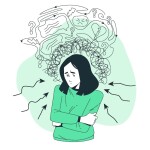Addiction and stress usually create a vicious cycle that can severely affect the individual's physical, emotional, and mental well-being. Though stress is a natural reaction to any situation, chronic or long-term stress leads to unhealthy coping mechanisms, which is often addiction. Therefore, understanding how these two dynamics interplay is essential for addressing their root causes and finding effective solutions.
What Is Stress?
Stress is the body's response to any demand or challenge. It triggers the "fight or flight" response, leading to the release of hormones such as cortisol and adrenaline to make the body ready to meet the threat. While short-term stress may have positive impacts in enhancing performance and concentration, chronic stress can cause significant harm. Prolonged exposure to stress upsets most bodily systems and hampers immunity, digestion, sleep, and mental well-being.
Causes of stress:
- Financial pressures
- Workplace demands
- Family or relationship issues
- Major life changes
- Health concerns
When these stressors are not removed, it can make the person seek unhealthy coping strategies. Among those is substance use or behavioral addiction.
What Is Addiction?
Addiction is a chronic, relapsing disorder , which is characterized by compulsive seeking and use of a substance or engagement in a behavior, despite adverse consequences. Addictions can take many forms: substance addiction (alcohol, drugs) and behavioral addiction (gambling, gaming, shopping, etc.).
Fundamentally, it changes the reward system in a brain. Such substances or actions triggering addiction overflow the brain with dopamine, providing the user or perpetrator with pleasure or relief. Gradually, the external provision of dopamine from such a source deprives the natural reward-processing capabilities of a brain, sustaining the chain of addiction.
Relation Between Stress and Addiction
1. Stress as an on-switch for addiction
Stress is one of the most significant risk factors for the initiation and maintenance of addiction. Many people use addictive substances or behaviors as a way to escape or numb their stress. For example:
- Alcohol may be used to unwind after a long, stressful day.
- Drugs may provide temporary relief from anxiety or depression.
- Behavioral addictions like excessive shopping or gaming might distract from overwhelming problems for a little while.
These methods may help momentarily, but they usually cause the creation of financial, social, and health-related complications, which in turn aggravate stress in the long term.
2. Addiction as a Source of Stress
Ironically, addiction itself becomes a major source of stress. The compulsive nature of addiction leads to strained relationships, financial instability, and legal issues, which heighten the stress that the individual sought to escape. In addition, the physical toll of substance abuse, including withdrawal symptoms and health deterioration, adds to the stress level.
3. Role of the Stress-Addiction Cycle
The interplay between stress and addiction creates a self-perpetuating cycle. Stress triggers addiction, and addiction, in turn, generates more stress, leading to deeper entrenchment in harmful behaviors. Breaking this cycle requires addressing both the stressors and the addictive behaviors simultaneously.
The Science Behind Stress and Addiction
1. Cortisol and the Brain's Reward System
Chronic stress elevates cortisol levels, which can actually damage the brain's reward system. High levels of cortisol reduce the effectiveness of dopamine, making one feel less pleasure in any activity. This makes addictive drugs or behaviors more attractive, as they give an artificial dopamine boost.
2. Neurological Vulnerabilities
Stress impacts the prefrontal cortex, which is responsible for many decisions and controls impulsiveness. Chronic stress further compromises this brain region, predisposing users to impulsive or dangerous conduct, including drug use or excessive participation in addictive pursuits.
3. Genetic and Environmental Factors
Certain individuals have a genetic predisposition towards being sensitive to stress and prone to addiction. Further added is environmental influence, such as through traumatic upbringings or exposure to substance abuse. Together, these factors give way to fertile ground for the onset of stress-related addiction.
Types of Stress-Related Addictions
1. Substance Addiction
Some substances include alcohol, nicotine, and drugs, which most individuals use to relieve themselves from stress. The temporary relief comes with the long-term cost of dependence and poor health effects.
2. Behavioral Addiction
Stress also causes non-substance addiction in the form of:
- Gambling: While this provides an escape into a world of fantasy, it results in a compounding financial problem that adds to financial stress.
- Games: Video games may be a safe haven in a virtual world but cause isolation and neglect of duties.
- Food: The first instinct of people to cope with stress is often to overeat, leading to obesity and associated diseases.
- Shopping: Retail therapy might provide some relief for a short time but lead to debt and guilt.
Breaking the Cycle of Stress and Addiction
Breaking the stress-addiction cycle demands a holistic approach. These are some of the effective ways through which it can be broken:
1. Stress Management Techniques
The management of stress in healthy ways is essential in the prevention and management of addiction. Some techniques include:
- Mindfulness and Meditation: Reduces stress through relaxation, enhances emotional regulation.
- Physical Activity: Reduces stress by releasing endorphins and promotes general well-being.
- Time Management: Task prioritization and setting achievable goals can minimize the feeling of being overwhelmed.
- Social Support: Friends, family, or support groups can be very helpful to provide emotional relief and give a new perspective.
2. Professional Help
For people deeply in the cycle of stress addiction, it may require professional intervention. Some options are:
- Therapy: Cognitive-behavioral therapy (CBT) can help identify and alter thought patterns that contribute to stress and addiction.
- Rehabilitation Programs: These provide structured environments for detoxification, recovery, and skill-building.
- Medication: Medications may sometimes be prescribed to help with withdrawal symptoms or other mental health disorders.
3. Resilience
Developing resilience—the ability to adapt to and recover from stress—is an excellent antidote to addiction. Some strategies are:
- Practice gratitude
- Live a healthy lifestyle
- Learn to say no to prevent overcommitting
- Develop problem-solving skills
The Role of Society in Combating Stress and Addiction
While individual efforts are crucial, societal changes are equally important. Employers, educators, and policymakers can play a significant role by:
- Promoting work-life balance and mental health support in workplaces
- Educating communities about the dangers of addiction and the importance of stress management
- Ensuring access to affordable mental health services and addiction treatment
Conclusion
The interplay between stress and addiction is complex but not insurmountable. Understanding the mechanisms that tie these two forces together with proactive strategies can help one break free from their grasp and lead healthier, more fulfilling lives. Overcoming this challenging cycle requires addressing both stress and addiction simultaneously, both through personal efforts, professional help, and societal support. With resilience, awareness, and the right resources, recovery and balance become within reach.
Taking the step to join a de-addiction program like Prarambh Life is not just a commitment to quit addiction but a promise to rediscover yourself. It’s about choosing hope, resilience, and a life filled with purpose. Recovery may not be easy, but with the right support system and determination, it is possible. If you or someone you know is battling addiction, don’t hesitate to take that first step—it could be the start of a beautiful new beginning.








